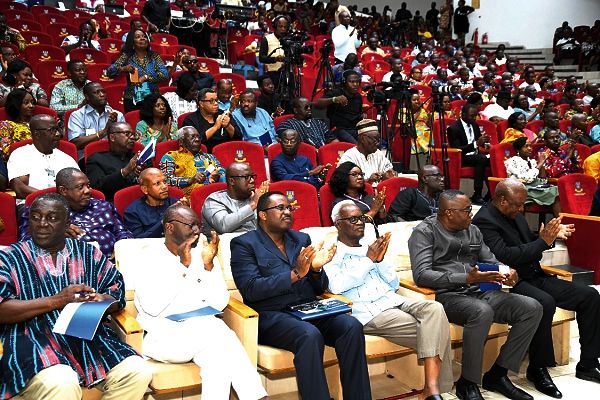
Manage country’s resources to benefit people — Prof. Soludo
A former Governor of the Central Bank of Nigeria, Professor Charles C. Soludo, has asked Ghana to prudently manage its natural resources for the benefit of its people.
“I would like to plead with Ghana, in the name of God: do not learn from the Nigerian example in the management of your natural resources. The resources belong to the current and the next generations and so do not misuse them.
“Do not be a country where leaders just create and share the proceeds from natural resources and forget to use those resources to build systems and institutions that will promote development,” he entreated.
Event
Speaking at an inaugural economic forum organised in memory of the late former Vice-President, Mr Paa Kwesi Bekoe Amissah-Arthur, in Accra last Friday, Prof. Soludo also stressed the need for African universities to review their academic and training programmes to develop the right calibre of human resource needed to harness and transform their countries’ resources for accelerated growth.
“African countries should start looking at the content of their academic courses to make sure that technology is inculcated in their programmes, instead of the rote learning. Tomorrow’s world will no longer be about what you know but what you can do.
“I know that in Ghana you have policies such as One-village, One-dam and One-district, One-factory (1D1F), but you should also start rolling out initiatives such as one youth-one skill; One-village, One-clinic or One-village, One-technology-based school,” he suggested to thunderous applause.
Amissah-Arthur Economic Forum
The forum was organised by the K.B. Amissah-Arthur Foundation, in collaboration with the Economics Department of the University of Ghana, to commemorate the first anniversary of the passing of the former Vice-President.
It was on the theme: “Making sense of economics”.
The lecture highlighted critical economic and development challenges in African countries and the way forward in resolving those bottlenecks.
Participants included people from all walks of life, including politicians, members of academia and economists.
The family of the former Vice-President announced the institution of two initiatives — the K.B. Amissah-Arthur Chair in Economics and a PhD Award at the Economics Department of the University of Ghana — to support research activities for innovative solutions to economic challenges in the country.
Visionary leadership
Prof. Soludo further urged African countries to focus on policies that would help build the technical capacity of their human resource for sustainable development.
He observed that the future of African countries was not in the abundance of natural resources but rather the quality of human capital.
The former governor also advocated a one-term tenure of at least seven years for African Presidents to enable them to effectively implement economic policies that would transform their countries.
According to him, the four-year tenure did not give political leaders the opportunity to roll out sound policies, since they only focused on programmes that would help them gain political capital.
He also asked academics and technocrats in Ghana and other African countries to actively partake in the national development process by offering expert advice to politicians on key national issues, instead of sitting on the fence.
On population, Prof. Soludo stressed the need for African countries to start rolling out proactive population policies that would help harness the energies of the continent’s growing population.
“I know many African countries have policies not to leave anyone behind in terms of education, health and other initiatives, but people should not use these policies as a licence to have many children,” he advised.
Prof. Soludo also urged African countries to take steps to control irregular migration by the youth of Africa.
Panellists’ views
Panellists at the forum called for strategic investments in human resource development, agriculture and technology to help transform Ghana’s economy and promote sustainable development.
They emphasised that such investments must thrive on public-private partnerships (PPPs) and technology exchanges to open up the economy to create sustainable jobs.
The panellists included the Chief Executive Officer (CEO) of Dalex Finance, Mr Kenneth Thompson; a professor at the Institute of Statistical, Social and Economic Research (ISSER) of the University of Ghana, Professor Peter Quartey; a lecturer at the Economics Department of the university, Dr Priscilla Twumasi Baffour, and a former CEO of the Ghana Investment Promotion Centre (GIPC), Mrs Mawuena Trebarh.
Strategic investment
According to Mr Thompson, the most prudent way to boost investments was for the government to provide incentives for investors.
Prof. Quartey said the increasing dynamics in the global economy required citizens to adopt modern technology and acquire skills that would make them productive.
For her part, Mrs Trebarh observed that the only way by which Ghana could attract investors to help transform the economy was to showcase the country's worth.
Taking her turn at the panel discussion, Dr Baffour said the way forward to transform the economy was to make conscious efforts at patronising local goods.
She said the made-in-Ghana agenda ought to be backed by a positive mindset and confidence in the quality of local goods and resources.
